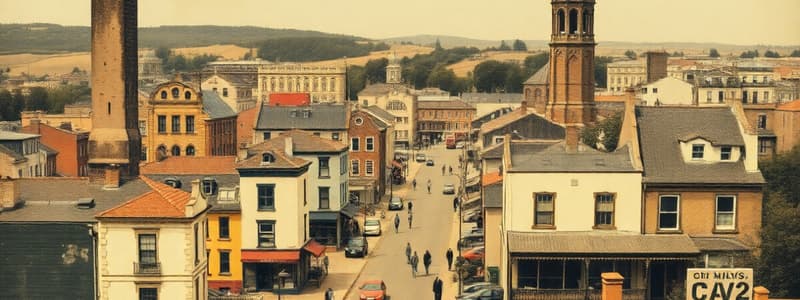Podcast
Questions and Answers
Which tense is most appropriate to use when describing changes to your hometown over a period of time?
Which tense is most appropriate to use when describing changes to your hometown over a period of time?
- Present perfect, to describe changes over time. (correct)
- Present simple, to describe current activities.
- Future simple, to describe changes that will happen.
- Past simple, to describe finished actions.
When describing a town you grew up in, which tense should you use to describe something that no longer happens?
When describing a town you grew up in, which tense should you use to describe something that no longer happens?
- Present perfect.
- Future perfect.
- Present continuous.
- Past simple. (correct)
In a speaking test, if the examiner asks about the characteristics of your hometown, what linguistic strategy demonstrates good vocabulary range?
In a speaking test, if the examiner asks about the characteristics of your hometown, what linguistic strategy demonstrates good vocabulary range?
- Repeating the same adjective with different intonations.
- Using pairs of adjectives with similar meanings. (correct)
- Using simple, common adjectives to ensure clarity.
- Avoiding adjectives altogether to focus on facts.
Which of the following is the most appropriate way to start answering an examiner's question in a speaking test?
Which of the following is the most appropriate way to start answering an examiner's question in a speaking test?
When describing the location of a building in your town, which preposition would be most appropriate to use for a building directly across from another?
When describing the location of a building in your town, which preposition would be most appropriate to use for a building directly across from another?
You want to describe your hometown as a place that has both historic buildings and modern developments. Which pair of adjectives would best convey this?
You want to describe your hometown as a place that has both historic buildings and modern developments. Which pair of adjectives would best convey this?
When answering questions about changes in your hometown, why is it important to listen carefully to the examiner?
When answering questions about changes in your hometown, why is it important to listen carefully to the examiner?
If you are describing a place that is lively both during the day and at night, which pair of adjectives would best illustrate this?
If you are describing a place that is lively both during the day and at night, which pair of adjectives would best illustrate this?
When describing a town that is known for its financial activities, which adjective is most appropriate?
When describing a town that is known for its financial activities, which adjective is most appropriate?
If you want to describe a building that is very large in your hometown, which adjective is most appropriate?
If you want to describe a building that is very large in your hometown, which adjective is most appropriate?
Which of the following describes a place that is full of people and possibly difficult to move around in?
Which of the following describes a place that is full of people and possibly difficult to move around in?
Which option describes the best way to improve your answers for a speaking test?
Which option describes the best way to improve your answers for a speaking test?
Complete the sentence with the most appropriate option: 'The art gallery is _______ the cinema and a big shopping mall.'
Complete the sentence with the most appropriate option: 'The art gallery is _______ the cinema and a big shopping mall.'
Complete the sentence in the most appropriate option: 'In the last ten years, my home town ______ a lot.'
Complete the sentence in the most appropriate option: 'In the last ten years, my home town ______ a lot.'
If you _______ younger, what did you use do?
If you _______ younger, what did you use do?
How many ways can you pronounce the ending of regular past simple verbs?
How many ways can you pronounce the ending of regular past simple verbs?
What do people go to the harbor to do?
What do people go to the harbor to do?
If describing your town is located in the north-east, what category does that fall under?
If describing your town is located in the north-east, what category does that fall under?
Which of these options best describes the climate?
Which of these options best describes the climate?
Which category does 'ancient' fall under?
Which category does 'ancient' fall under?
Flashcards
Past Simple
Past Simple
A tense used to describe actions completed in the past.
Present Perfect
Present Perfect
Tense that connects the past to the present, indicating completed actions or experiences.
Present Simple
Present Simple
Describes habitual actions or general truths.
Location Adjectives
Location Adjectives
Signup and view all the flashcards
Building Adjectives
Building Adjectives
Signup and view all the flashcards
Climate Adjectives
Climate Adjectives
Signup and view all the flashcards
Area Adjectives
Area Adjectives
Signup and view all the flashcards
Opinion Adjectives
Opinion Adjectives
Signup and view all the flashcards
Study Notes
- The unit focuses on places and buildings, with a speaking component.
- The unit aims to teach how to use prepositions and adjectives to describe a hometown
Lead-in Questions
- Tense Identification: Selecting the appropriate tense to answer questions about a hometown.
- Question 1: "Is there much for young people to do in your home town?"
- Appropriate tense: Present simple.
- Question 2: "What was your home town like in the past?"
- Appropriate tense: Past simple.
- Question 3: "Has your home town changed since you were a child?"
- Appropriate tense: Present perfect.
Using Prepositions to Describe Your Home Town
- Focus on using prepositions to describe locations in a hometown.
- An exercise involves matching places described in a script (town hall, shopping mall, library, harbour, art gallery, stadium, cinema, swimming pool) to locations on a map (A-H).
Town Locations
- Town hall (H): In the centre of town, on the north side of the square
- The art gallery :Over the bridge, a modern building with exhibitions, between the cinema and a shopping mall.
- The harbour: located to the south of the town
- The stadium: next to the harbour
- The public swimming pool: just behind the stadium
Using Adjectives to Describe Your Home Town
- Categorizing adjectives related to different aspects of a hometown.
- Categories: Location, Buildings, Climate, Opinion
Adjective Categories
- Location: on the coast, in the north-east, in the centre, outdoor, inland
- Buildings: busy, crowded, dirty, exciting, lively, quiet
- Climate: hot, humid, mild
- Opinion: industrial, business, financial
- Areas: tall, historic, ordinary, modern, old
Vocabulary Building
- Filling sentences with correct words in exercises to have variety of vocabulary when describing a city.
- Using pairs of adjectives with similar meanings to showcase a good range of vocabulary.
- Example: Describing a city as very busy and crowded.
Grammar Focus: Tenses
- Focus on using correct verb tenses (present simple, present perfect, past simple) when discussing a town or city.
- Questions from the examiner: where grew up? is it a good place to live? Do you think it has changed a lot?
Speaking Test Preparation
- The examiner asks questions about familiar everyday topics, requiring the use of a range of tenses.
- Listen carefully to the questions the examiner asks to decide the correct tense to use.
Tense Usage in Responses
- Example questions and how their answers use different tenses.
Part 1 Questions and Tense Selection
- Question: "Where were you born?"
- Correct tense: Past simple ("was born").
- Question: "Where did you grow up?"
- Correct tense: Past simple ("grew up").
- Question: "Has your home town changed much since you were a child?"
- Correct tense: Present perfect ("has changed").
- Question: "Is there anything that you used to do in your home town that you don't do now?"
- Correct tense: Past simple ("used to").
Pronunciation: Verb Endings
- Focus on the pronunciation of regular past simple tense endings (/t/, /d/, /ɪd/).
- bought: /t/
- built: /t/
- called: /d/
- changed: /d/
- discovered:/d/
- developed:/id/
- located: /id/
- situated: /id/
Sentence Completion
- Practice completing sentences with personal ideas to practice verb pronunciation.
Examiner's Questions Practice
- A listening exercise. Matching the speakers to the examiner's question, to test comprehension and understanding.
Exam Skills
- Further practice questions about your hometown. For example describing a town where you grew up.
Studying That Suits You
Use AI to generate personalized quizzes and flashcards to suit your learning preferences.




